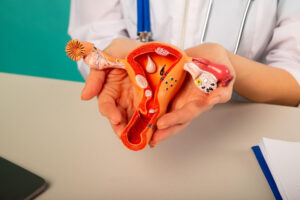The foods you eat during pregnancy are vital for your baby’s development, but so is what you drink! As your body works to support your growing baby, you’ll need to significantly increase your water intake, to keep up with the increased demands of your body. Staying hydrated is crucial, and drinking enough water offers numerous health benefits. Here’s everything you need to know about maintaining proper hydration throughout your pregnancy.
Health Benefits of Drinking Water
Sipping on water might seem like an effortless task, but it plays a crucial role in ensuring a healthy pregnancy. Here’s why:
- It Supports Your Body: About three-quarters of your body is composed of water, which supports essential functions such as digestion, temperature regulation, and hormone production. Proper hydration is a vital key to maintaining these functions effectively and keeping a balance.
- It Supports Your Pregnancy: During pregnancy, your water needs increase due to a higher metabolism and a significant increase in blood volume. This extra blood volume helps deliver oxygen and nutrients to your baby, making adequate hydration essential.
- Reduces Swelling: Many pregnant women experience swelling in their feet and ankles. Drinking more water can help alleviate this, as dehydration can lead to fluid retention. If swelling becomes severe or occurs suddenly in areas like the hands, legs, or face, consider consulting your healthcare provider, as it could be a sign of preeclampsia.
- Helps your Gut Health: Adequate water intake helps prevent constipation and hemorrhoids, common issues during pregnancy, by keeping your bowels moving and stools soft.
- Lowers the Risk of UTIs: Water helps dilute urine, promoting more frequent urination which flushes out bacteria and reduces the risk of urinary tract and bladder infections.
How Much Water Should You Drink During Pregnancy?
According to the American College of Obstetricians and Gynecologists (ACOG) and the Institute of Medicine, pregnant women should aim to drink about 10 8-ounce cups of water or other fluids daily. However, this recommendation can vary based on factors such as activity level, body size, and weather conditions. For instance, you might need more fluids in hot weather or if you’re exercising regularly.
A good rule of thumb to ensure you’re adequately hydrated is to check the color of your urine. It should be pale yellow or colorless. Feeling thirsty occasionally is normal, but if you find yourself feeling thirsty often, you might need to increase your fluid intake.
Additionally, fruits and vegetables with high water content, such as watermelon and cucumber, can help boost hydration. However, be mindful of juice consumption due to its high sugar content and extra calories, and limit caffeine intake to about 200 milligrams per day—roughly equivalent to one 12-ounce cup of coffee.
Staying Hydrated Through the Trimesters
- First Trimester: Early in pregnancy, your water needs increase, but you might not need to monitor your intake too closely unless morning sickness is an issue. Vomiting can lead to dehydration, so it’s important to drink extra fluids if you’re throwing up frequently.
- Second Trimester: As nausea typically subsides, you’ll need to focus on meeting your increased water requirements due to an expanding blood volume. While aiming for 10 cups of water might seem challenging, sipping throughout the day can make it easier. If plain water doesn’t appeal to you regularly try adding a splash of lemon or lime for a refreshing twist.
- Third Trimester: By this stage, your blood volume peaks, increasing by 50 to 60 percent compared to pre-pregnancy levels. Staying hydrated is crucial to prevent dehydration-related issues such as Braxton Hicks contractions, which can be mistaken for real labor.
Pro Tip: Keep a water bottle handy and drink regularly, even if you’re not feeling thirsty.
Being aware of various dehydration symptoms is important to address the issue promptly. Some Symptoms include:
- Extreme thirst
- Decreased urination
- Dark yellow or straw-colored urine
- Fatigue, confusion, or dizziness
If you experience any of these symptoms, especially if you’re unable to keep fluids down, feel disoriented, or have persistent diarrhea or black bowel movements, seeking medical advice immediately can be the need of the hour.
Additional Considerations
- Water Intake to Avoid Constipation: Constipation is common during pregnancy and can be exacerbated by iron supplements, which are necessary for your baby’s development. Ensuring adequate water intake can help relieve constipation and keep your digestive system functioning smoothly.
- Drinking Lukewarm Water: It is safe to drink lukewarm water during pregnancy. It can aid digestion, boost metabolism, and increase energy levels. Drinking lukewarm water can also help manage morning sickness and heartburn.
- Lemon Water: Drinking lemon water during pregnancy is beneficial. It boosts immunity, aids in fetal development, reduces nausea, and enhances hydration.
Staying hydrated during pregnancy is essential for both your health and your baby’s development. By following these guidelines and adjusting your water intake according to your body’s needs, you can help ensure a healthy pregnancy.
For personalized advice and support, consult a trusted fertility center like Boon IVF. A leading fertility clinic, based out of Hyderabad, Boon IVF specializes in addressing various challenges in fertility, with highly qualified fertility experts, providing holistic treatment with affordable pricing. Whether you’re facing fertility issues, looking for some advanced treatment, or simply looking for a one-on-one consultation on IVF, Boon IVF has the answers. Schedule an appointment today.


